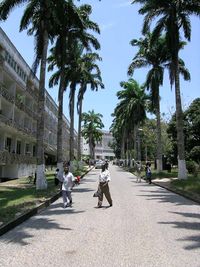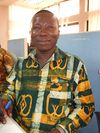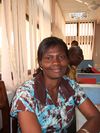LELADA
University of Education at Winneba
Graduate Program in Lexicography, Language Description and Analysis
LELADA Le(xicography) La(nguage) D(escription) A(analysis)
LELADA will offer a 4 years doctoral program in Linguistics with a focus on general linguistics (Phonology, Morphology, Syntax, Semantics), and digital language description and documentation of Ghanaian languages
LELADA's vision is to support linguistic education in Ghana with the goal to teach future language experts skills in creating and interpreting spoken and written language. This will make LELADA graduates highly employable not only in the educational system, but also in general administration and industry.
Next to its educational goal, LELADA is dedicated to the creation of digital language resources for the languages of Ghana.
Present LELADA Projects
| Project owner | Project description |
| The role of Tone in the morpho-syntax of Akan.
Akan, being a tone language, makes use of two contrastive tones, high, and low, in addition to its segmental phonemes, to distinguish meaning in the language. Lexical tone distinguishes pápá ‘good’ from pàpá ‘father’ and pàpà ‘fan’. Tone has also a grammatical function, for instance, it serves to distinguish habitual aspect from stative aspect. Examples are dá and dà as in Kòfí dá ǃhɔ́ ànɔ̀pá bíárá ‘Kofi sleeps there every morning’ and Kòfí dà hɔ́ sèìséí árá ‘Kofi is sleeping there right now’ and gyìná and gyìnà as in Kòfí gyìná hɔ́ ‘Kofi stands there’ and Kòfí gyìnà hɔ́ ‘Kofi is standing there’. A further example for grammatical tone is past tense marking. For example the word fá ‘to take’ just like dí ‘to eat’ and many other verbs, have a low tone in the past tense when followed by an object, but a high tone when used intransitively as in the examples: Kòfí fàà àdùàné nó kɔ̀ɔ̀ fíé ‘Kofi took the food home’ and Kòfí fá kɔ̀ɔ̀ fíé ‘Kofi took it home’. Although the verb fá is in the past tense in both sentences, it features different tone depending on its pattern of argument realisation. In addition not only Tone but also vowel length depends on the presence or absence of an object NP. Though much work has been done on Akan tones, little attention has been paid to allotones. Therefore this project seeks to discuss the role of tone in the morpho-syntax of Akan, highlighting the allotones and the factors that account for their realization. Using Elan and TypeCraft a corpus of Akan will be built to support the present project | |
| Kwasi Adomako | Tonal Phonology of loanwords adaptation of Akan and ... |
| Structures of Akan VPs | |
| Categories of Akan verbs | |
| Acoustic correlates of vowel harmony in Farefari | |
| A morphological and socio-linguistic study of Ewe animal names
The linguistic nature of animal names among the Ewe of Ghana has so far not been investigated. It is worrisome that Ewe people use more and more English to name animals, and it needs to be feared that with rising education among the Ewe, the Ewe names for animals will be replaced with the English names. In documenting Ewe animal names, I will focus on their origin, their morphological structure and on the socio-linguistic factors that have influenced the naming process. This study intends to create a digital lexicon of Ewe animal names, using methods established in digital lexicography and language documentation. | |
| A socio-linguistic analysis of Gurenɛ proverbs - Choice and Usage. This study focuses on the
use of proverbs in the interaction between parents and children. | |
| Syllable Structure Processes in Dagbani
Segmental processes related to syllable structure in Dagbani are heavily underdescribed and have so far never been systematically treated from a theoretical perspective. This project will remedy these empirical and theoretical shortcomings: we will provide a comprehensive description of the relevant processes as well as a phonological analysis of the patterns within the framework of Autosegmental Theory (Goldsmith 1976). The results will significantly enlarge our understanding of the Dagbani grammar. | |
| We all are deeply saddened to learn about Stephen Ndako's death.
We would like to express our sincerest condolences on the death of Stephen Ndako. Stephen was with us from the beginning of LELADA. He was enthusiastic about having a graduate school in Winneba. As a man of the first hour, he always was present, always with the action and ready to share a good laugh. Stephen was involved in a motor accident. He went into a coma for a week and died on the on May 4, 2012. We all will miss Stephen. Stephen, you will always be in our hearts. | |
| Complementation in Ga
Ga is one of the languages spoken by the Accra people of the southern part of Ghana. It is spoken by the Ga Mashi, Osu, La, Teshi, Nungua, Tema and the Kpone. Ga belongs to the New Kwa group of the Niger-Congo language family. A number of literary works, including the English- Ga Dictionary by Kropp Dakubu (2009), has been published on Ga. Next to the phonology of Ga (Dakubu 2002) (Wentum 1997), and the morphophonemics (Otoo 2005) also the sentence structure has been studied (Dakubu 2003), yet a study of different complementizers, analysing their meaning and their use, has not yet been undertaken. As our primary source we will use recordings from interactive radio programs, especially TV Africa and Obonu F.M. which we will transcribe and analyse using TypeCraft and ELAN. For more information about Ga see also Typological_Features_Template_for_Ga. A list of references can be found on my user page at Ruby Otoo | |
| Compound formation in Dagbani.
The main focus of the study is word compounding in Dagbani, which is one of the least studied area in Dagbani. In order to examine the morphological, phonological, semantic and syntactic processes in Dagbani word compounding, the following questions must be addressed.
| |
| Vowel Harmony in Nzema. | |
| Sapaty Afeafa Georgina | Comparative study of the phonological structures of two dialects of Ewe. |











